By Anna Gustafson
Bent over a pile of dirt in St. John’s University’s garden last week, Christian Garcia, a middle-school student from East Elmhurst, mopped the sweat from his brow and carefully planted a row of corn seeds under a sky that had not yet made good on its promise of rain.
After placing each seed in the ground, Garcia looked up at Erin Chalmers, president of St. John’s earth club, who would nod in reassurance that the boy who had no background in gardening had done it correctly. After the last seed disappeared from his palm, he stepped away from his work and triumphantly brushed off the dirt from his hands.
“It’s a lot of fun,” said Garcia, one of about 180 middle-school students from underprivileged neighborhoods who braved the dog days of summer last week to participate in a free two-day training session that taught them how to implement environmentally friendly practices in their schools and communities.
The university landed a $90,000 federal grant to offer the sessions Thursday and Friday for students from five public schools in Jamaica, Long Island City, Jackson Heights, Astoria and Fresh Meadows. Participants were able to attend the two days at St. John’s for free and they will also receive $2,500 each toward their college education should they meet the program’s requirements.
To successfully complete the program, students must take what they learned and spend 100 hours putting it to good use in their schools or home communities to make them greener.
For students like Adia Ellis, 11, of Briarwood and Samantha Rodriguez, 11, of Richmond Hill, that means spreading the word about the importance of the environment and helping to grow the garden at their school, JHS 217.
“I really like learning more about the environment because then we can help other people out,” Ellis said.
Rodriguez said she especially like the program’s “adventures.”
“We get to learn how to plant things like flowers,” she said. “Everything is interesting.”
Richard Sinatra, associate dean of academic affairs in the School of Education and a professor, applied for the $90,000 grant earlier this year and said he was thrilled to learn St. John’s was one of 10 who received the funding for which more than 100 schools had applied.
A number of St. John’s faculty and students were involved in the program, and three university biology majors gave a presentation on concrete ways students could become more conscious of the environment. For example, Joanna Shields, a senior from Breezy Point, suggested student advocate their parents carpool, use less water while showering, do not print unnecessarily and plant trees or gardens.
“We want them to realize helping the environment is not as hard as it seems,” she said. “There are little things you can do — composting, planting — that make a difference.”
Reach reporter Anna Gustafson by e-mail at agustafson@cnglocal.com or by phone at 718-260-4574.



































